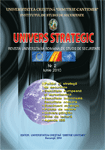SPONSORIZAREA TERORISMULUI
TERRORISM SPONSORSHIP
Author(s): Aurelian BădulescuSubject(s): Politics / Political Sciences, Security and defense
Published by: Universitatea Crestina "Dimitrie Cantemir"
Keywords: terrorism; abductions; terror: case studies;
Summary/Abstract: Is there a difference between terrorism and the use of specific tactics that exploit fear and terror by authorities normally considered "legitimate"? Nations and states often resort to violence to influence segments of their population, or rely on coercive aspects of state institutions. Just like the idea of equating any act of military force with terrorism described above, there are those who equate any use of government power or authority versus any part of the population as terrorism. This view also blurs the lines of what is and is not terrorism, as it elevates outcomes over intentions. Suppression of a riot by law enforcement personnel may in fact expose some of the population (the rioters) to violence and fear, but with the intent to protect the larger civil order. On the other hand, abuse of the prerogative of legitimized violence by the authorities is a crime. But there are times when national governments will become involved in terrorism, or utilize terror to accomplish the objectives of governments or individual rulers. Most often, terrorism is equated with "non-state actors", or groups that are not responsible to a sovereign government. However, internal security forces can use terror to aid in repressing dissent, and intelligence or military organizations perform acts of terror designed to further a state's policy or diplomatic efforts abroad. A government that is an adversary of the United States may apply terror tactics and terrorism in an effort to add depth to their engagement of U.S. forces. Repression through terror of the indigenous population would take place to prevent internal dissent and insurrection that the U.S. might exploit. Military special operations assets and state intelligence operatives could conduct terrorist operations against U.S. interests both in theater and as far abroad as their capabilities allow. Finally, attacks against the U.S. homeland could be executed by state sponsored terrorist organizations or by paid domestic proxies.
Journal: Revista Univers Strategic
- Issue Year: I/2010
- Issue No: 4
- Page Range: 230-241
- Page Count: 12
- Language: Romanian

